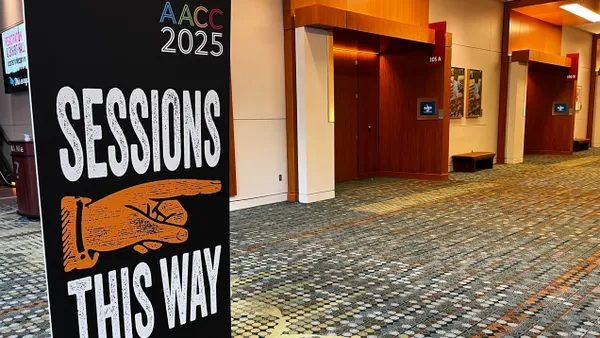Dive Brief:
- Part-time students, caregivers, adults over 30, and students at law schools listed low on U.S. News & World Report’s rankings were more likely than their peers to report favorable experiences in online J.D. classes, according to a survey conducted by Gallup and AccessLex Institute.
- However, the majority of all groups of surveyed students preferred in-person courses over online classes. Caregivers were the subgroup most likely to favor online classes, with 40% of them saying virtual courses were preferable to in-person ones.
- Students who are members of racially underrepresented groups were more likely to prefer online courses compared to non-Hispanic students who are White or Asian. But underrepresented students were also less likely to believe that their programs were worth the cost.
Dive Insight:
Among the surveyed groups, 36% of older students, 35% of students at lower-ranked law schools, and 32% of underrepresented minority students said they preferred online courses. Overall, 26% of all students surveyed said they preferred online courses.
Tiffane Cochran, vice president of research at AccessLex, said it’s too early to draw long-term conclusions about online instruction from the data.
That’s because researchers surveyed J.D. students in 2021 and 2022, when many traditional law schools were offering online courses to address the COVID-19 pandemic. The remote courses students were taking at the time were often designed without ample preparation.
Long-standing hybrid J.D. programs probably observe more student satisfaction with online instruction, Cochran said, because their enrollees chose to attend remote courses.
“Students that were hit by the pandemic, like all of us in schools, were not prepared for something like this,” Cochran said. “We have to continue to monitor student perceptions and give law schools an opportunity to think more thoughtfully and intentionally about how they design these courses and how they integrate them into this long-standing traditional J.D. program format.”
In May, the American Bar Association changed its distance education standards for J.D. programs. Students can now take up to half of their classes online in an accredited program. Previously, the limit was one-third of classes, and hybrid programs had to to be approved by the ABA to offer more remote courses.
Students at less selective law schools appeared to be more open to online courses in their law programs. Cochran said it’s unclear exactly why that may be the case, but it’s possible that these schools are more oriented toward access and are already offering more student support.
The report recommended that law schools design distance learning courses with their students’ goals in mind. Students enrolling online so they can take care of children may have different expectations than those who are attending virtually to make it easier to also work.
Law schools might survey their own students, Cochran said, to get a better sense of their needs and desires.
“It is worth it,” she said. “You just need to be targeted in how you think about it.”













